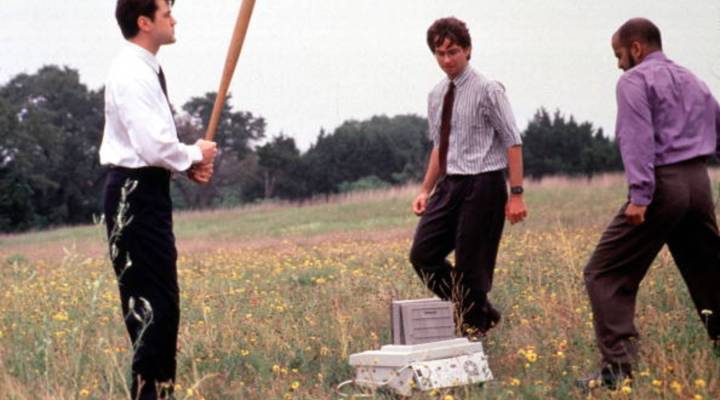
Why your doctor still relies on fax machines

Fax machines have all but disappeared from most of our lives, except for one industry that’s pretty tough to avoid: health care. If the rest of the working world has since moved on to digital messaging, why can’t medical professionals?
That’s the question that Vox’s Sarah Kliff tried to answer in an episode of “The Impact,” a podcast that takes a closer look at the way policies affect our daily lives. And in her investigation, Kliff found that it was a combination of culture and well-intended policy that’s lead to the fax machine being a staple in doctors’ offices.
Marketplace host Adriene Hill talked with Kliff about her reporting. The following is an edited transcript of their conversation.
Adriene Hill: So do we have any sense of how common it is that doctors and hospitals are faxing medical records? Is it the primary form of communication?
Sarah Kliff: It appears to be. So, there is very, very little email. Most of the communication from the doctors I interviewed, the experts I talked to, is still happening over the fax machine. I spent a lot of times in doctors offices, not in the actual office, but in these backrooms you don’t usually go to, and their fax machines, they’re buzzing all the time. It’s just a constant whirlwind of paper. It feels a little bit like going back to a 1980s office in most doctor offices right now….
Hill: So why fax and not email, let’s say? Why can’t I just send the file over an email system?
Kliff: A lot of the doctors I talked to say it has to do with routine. They’ve become so used to faxing, it’s just how it works, that they don’t really understand the email product. It’s harder to use, it’s clunky. But one thing we’ve seen, which has been great, is that the vast majority of American doctors have adopted electronic records over the past decade. There was this federal push with all these financial incentives that gave doctors money if they went electronic. And doctors did it.
Hill: Now these electronic records, as I understand it, were part of the stimulus plan back in 2009, right?
Kliff: Yeah, they were part of that much, much larger stimulus bill.
Hill: And the whole idea was that they would kill the fax, that they would make this easier. So why didn’t it happen?
Kliff: Yeah, so we did see doctors adopt electronic records. More than 90 percent of American doctors now have gotten rid of paper at some level, have their records in the digital area. But there were no financial incentives in the stimulus law to connect the offices to one to the other. So the situation you have right now, which just seems very crazy, is that doctors are printing out their own electronic records, faxing it to another doctor office, and then that doctor uploads the printout of the record into their own electronic record. So it’s because there weren’t any sort of incentives for doctors to connect to each other that we have this digital, but really disconnected, health care system.
Hill: It’s clearly inconvenient, but are there other reasons it’s a bad idea that we still depend on these fax machines?
Kliff: Yeah, it can be harmful for patients’ health, especially in an emergency situation where someone comes into an office, and they’re trying to figure out what’s wrong with this person. And you know, I talked to doctors who say it can take days to get your fax returned, because you’re faxing it, you’re calling to see if the fax was received. Maybe the line was busy, and all the while, you know, doctors are trying to figure out what’s wrong with this patient? So it makes our care worse when our doctors aren’t able to talk to our other doctors and are relying on this really outdated technology.
Hill: What would it take to actually kill the fax machine? To successfully kill the fax machine?
Kliff: So depending on who you talk to, you get a lot of different opinions. The Obama-era folks who started this plan, they seem to think you need to outlaw the fax machine. You need to say, you know, “By 2020, 2025, this is not an acceptable way to transfer information. You’re going to have to upgrade.” The Trump administration has a pretty different take. They think by getting rid of certain regulations, by making it easier for electronic records to talk to each other, that they can encourage doctors to adopt email without that kind of mandate.
Hill: Any bets here? How much longer we’re going to hear that fax machine buzzing sound in the back of our doctors’ offices?
Kliff: I came away from this podcast episode pretty pessimistic. The fax was here to stay for a while, just because it has survived for so long. It is so integral to many, many doctors’ offices, and there just aren’t economic incentives right now for doctors to connect with each other. And I think until there are, it’s going to be hard for a hospital to invest the money you would need to move off of a fax machine.
| Using bitcoin’s technology to wrangle widespread medical records |
| Why are most health plans tied to the calendar year? |
| Government seeks to improve patient access to records? |
There’s a lot happening in the world. Through it all, Marketplace is here for you.
You rely on Marketplace to break down the world’s events and tell you how it affects you in a fact-based, approachable way. We rely on your financial support to keep making that possible.
Your donation today powers the independent journalism that you rely on. For just $5/month, you can help sustain Marketplace so we can keep reporting on the things that matter to you.


















